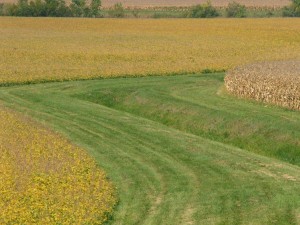Hello Friends,
Every July, I write a topic about conservation practices. I do so because I strongly believe in the value of a couple of practices available under the continuous signup for the Conservation Reserve Program.
We have all read about the algae bloom that takes place each year in the western basin of Lake Erie and if you read much, you have heard about the woes of Grand Lake St. Marys
Guess who shoulders a large portion of the blame for this. Farmers do.
There is no doubt that septic systems and municipal waste also contribute significantly to the above situations, however, fertilizer runoff is considered the major culprit. That is why I write about filter strips and waterways that can be installed under the CCRP.
Erosion control
If you haven’t suffered any erosion during these past rains, you are fortunate, but I’ll bet you have. Now is the time to start planning for this program. The Continuous CRP is just that. You can sign up anytime. There are a number of practices available to sign up for 10 or 15 years , but we’ll discuss two that I feel are extremely beneficial.
Why sign up? To be a good steward of the land? That’s part of it, but actually we will pay for the ground enrolled in this program. We will provide a dollar per acre rent each and every year that the contract is in effect. We will also provide cost share to install the practices — 90 percent of the amount to install the practices, since these are considered high priority practices.
Eligibility
To be eligible the ground must have had an annually planted crop four out of six years from 2002-2007. ( I know, don’t ask).
I viewed a field in my county that had such severe erosion in it that you could drop a pickup truck into it and it wouldn’t have been visible. I’m not kidding. The erosion was unreal and the field was actually split into and couldn’t be farmed across. The farmer had to plant one half and the head down to a road to travel to the other half of the field.
If a waterway had been properly installed years ago, this situation would not have occurred.
Filter strips along continuously flowing streams keep herbicides, pesticides and fertilizer runoff from entering the water. The filter strips provide access for trucks, combines, grain carts and help ease planting and harvesting. They also provide a buffer that the critters, who like to munch on your crops, don’t seem to like to cross as well. You can also see them there to dispatch of them.
Stop by your local FSA discuss these practices with the staff, to prepare now for either fall or spring installation.
If you cash rent land, encourage your landowners to sign up. They can receive the CRP payment and you will be removing that ground from what you pay cash rent on and, besides, that ground is probably not as productive as the rest of the ground.
All that and you can be a good steward of the land.
That’s all for now, FSA Andy













